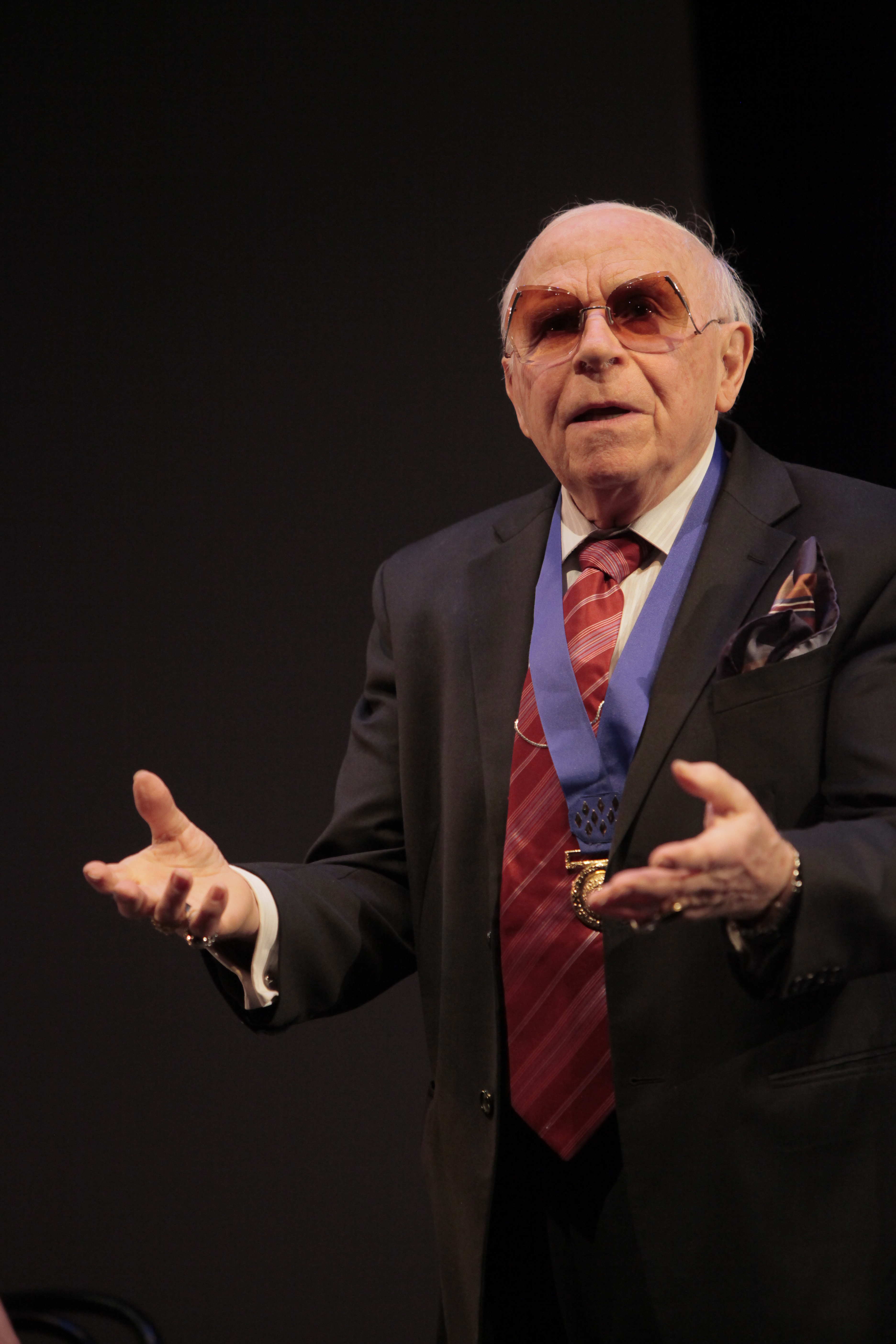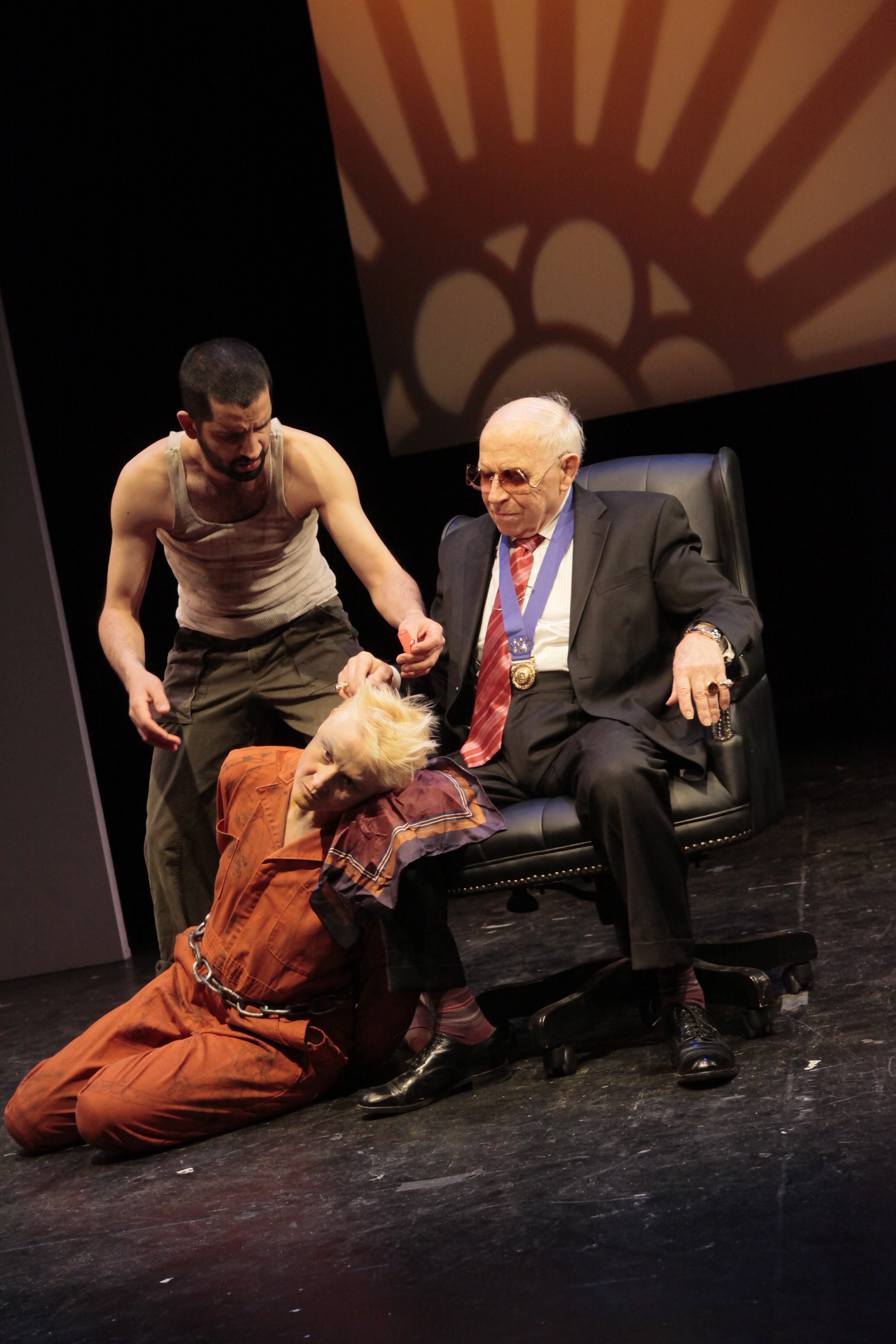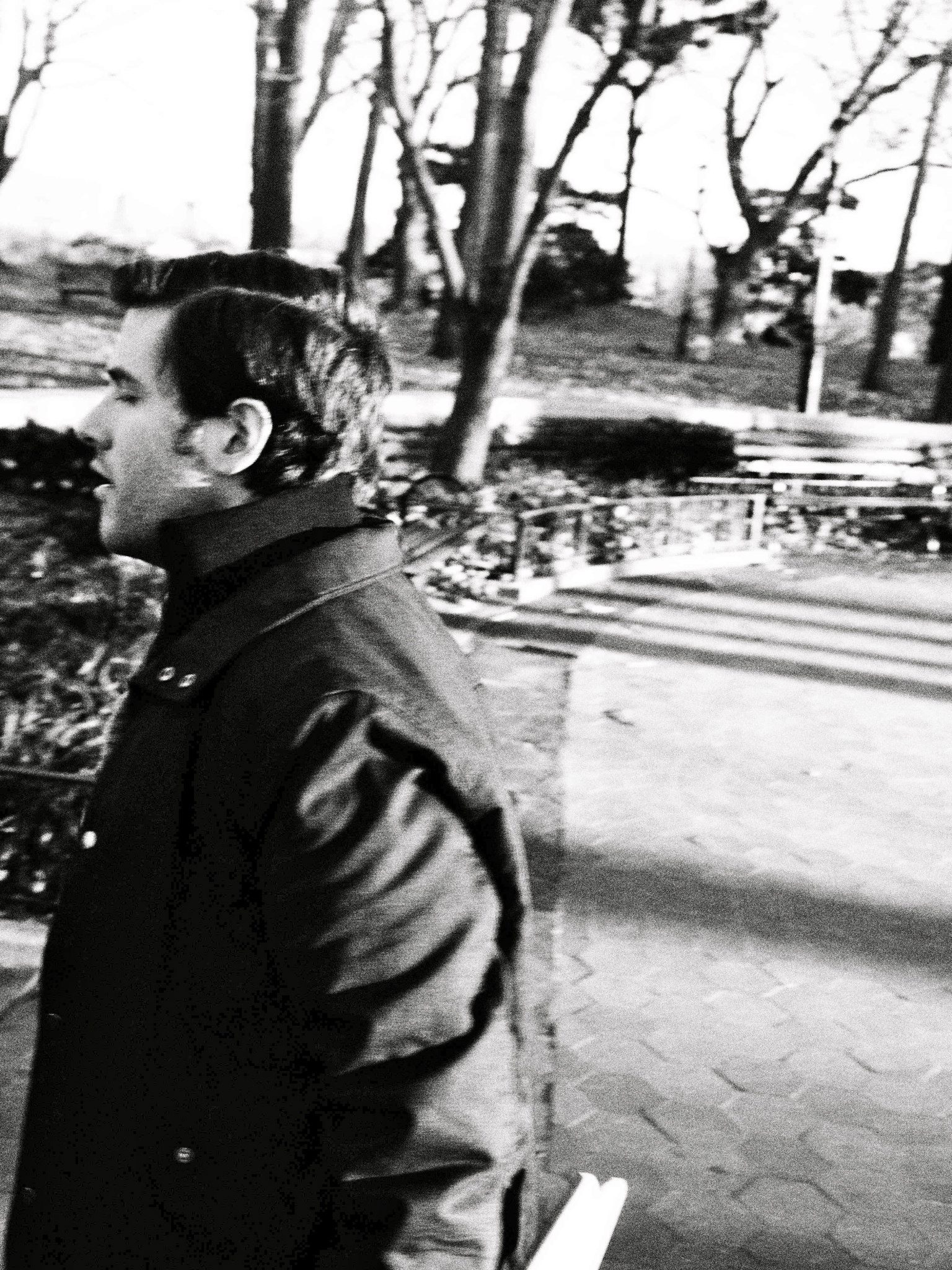I walked into Another Life expecting to be brainwashed by left wing liberal proselytizing. After all, the play was being hosted by an “experimental” off-off Broadway theater in the East Village and its subject matter confronted the George W-era U.S. torture program. But the play’s solid foundation in facts (the three torture stories in the play were based on real testimonies of Iraqis imprisoned in Abu Ghraib) left me feeling both shocked by the history and inspired to reflect on its significance.
The play centers around Handel (played by George Bartenieff), a senior New York City business tycoon who founds a private military contracting firm to profit from the Iraq war. When the firm starts using “enhanced interrogation” on prisoners at Bagram Air Force Base in Afghanistan, Handel enlists his adopted daughter Lucia (Di Zhu) as the resident physician. Although Lucia complies at first, she gradually transforms into the real-life International Red Cross whistleblower who releases the organization’s Torture Report to the press. Meanwhile, Handel creates a Bagram microcosm at home, sexually abusing his wife (Christen Clifford) as his megalomania spirals him into dementia and death.

Courtesy of Beatriz Schiller.
Although Another Life has ended its stateside run, the RADA Festival of New Theater in London will be featuring the play for two performances on July 1st and 2nd. For more information and to learn about the highly acclaimed artists involved in the production, visit the Theater Three Collaborative website.
Since Another Life is “the only American play about the U.S. torture program” (Theater for the New City), I decided to talk with its writer/director Karen Malpede about her creative process and her motivations for putting it all together.
••••
When so many morally questionable actions arose in American politics following 9/11, why did you choose to focus on torture?
“The Iraq war started on the basis of two big lies told by George W. Bush, Dick Cheney, Colin Powell and Donald Rumsfeld to the people of the United States and the world, and printed on the front page of the newspaper of record, the New York Times. Now everyone, even Bush and company, admit that they were wrong.
There were no weapons of mass destruction in Iraq and Saddam Hussein and Osama bin Laden were not in cahoots. This last “piece of evidence” was elicited under torture and this is the first torture story told in my play “Another Life”. Ibn Al-Sheik Al-Libi, like many prisoners, was sold to the Americans by Pakistani bounty hunters. He was captured and tortured by the CIA until he “confessed” to knowing that Saddam Hussein helped to plan the 9/11 attacks. He died, or was killed, in prison.
So the Iraq war was started with the use of torture and it’s no surprise that it then produced an “enhanced interrogation” program that allowed for the torture of countless others, some of whom are on hunger strike in Guantanamo as I write. Torture not only wounds the person being tortured, but it corrupts the torturer. A number of enlisted men and women who were involved in torture at Bagram, Abu Ghraib and others prisons have since killed themselves.
Why did I write a play about the U.S. torture program in the wake of 9/11? Because it was not inevitable that having been brutally attacked by non-state actors this nation would decide to invade Afghanistan and Iraq, destroy its own economy and corrupt the very principles upon which it was founded. This was a choice made by bad rulers who employed torture to obtain the lies they fed to an uninformed, sheepish public. Everyone is now suffering the consequences. That is a tragedy. Tragedy is a combination of bad luck and bad choices that bring suffering upon a populace. But the purpose of tragedy in the theater is to allow us to see and to feel with greater clarity. That is catharsis: clearer sight.”
I read a press release online that said “reviewers are not invited but news and feature coverage are welcome.” I understand you wanted an unmediated audience experience of the play, but in a place like New York I would expect the media to be supportive of a play that encourages constructive dialogue about difficult, urgent issues. However, after the performance I attended, you mentioned during the talk back that your expectations of New York media outlets were different and that it was even difficult for you to find a venue willing to host the play. What does this say about New York’s presumably “progressive” cultural community?
“It says that there is no New York progressive cultural community. I wish there were. There exists an audience for plays that are powerful, demanding and truthful. This we know. Our problem is getting the word out in time for them to catch a limited run. The serious audience in New York has mainly stopped going to the theater. They’ve been disappointed too many times.”
On the Theater Three Collaborative website, it’s mentioned that Another Life is an answer to Zero Dark Thirty. Given the success and critical acclaim received by Zero Dark Thirty, what is different about your play that makes it tougher for people to swallow?
“Zero Dark Thirty” is based on the lies that the CIA told the filmmakers and that they chose to use as the basis for their film. There is absolutely no proof that torture played any role whatsoever in the assassination of Osama bin Laden. “Another Life” tells the truth about the U.S. torture program. If we had had the backing of a major U.S. government agency (The Department of Peace) and the huge publicity budget of “Zero Dark Thirty”, we would have reached a much larger audience. I’m not absolutely convinced that people only respond to violence and lies. I believe that truth and poetry might be compelling to a significant number. It is worth noting that many people critiqued “Zero Dark Thirty”—both as art and as docu-drama. I am one of them.”
Handel struck me as such a hyperbolic caricature of Cheney, Rumsfeld, the Koch Brothers, and the like, that your personal perspective on the politics surrounding 9/11 couldn’t be more clear. As you were writing the play, did you have a certain audience in mind? Were you expecting the audience to already be aware of the U.S. torture program?
“Of course I have a point of view. All artists have a point of view. I’d like to point out, too, that character is a collaboration between the play and the actor. George Bartenieff who plays Handel is one of the finest actors on the American stage. He brought his own rare abilities with language, psychological depth and physical agility to create an incredible character. He was trained in London; he was one of the first American interpreters of Samuel Beckett. His career spans 65 years. He is an American treasure and I am proud to call him my partner in theater and life. There is probably no other actor in this country who could play Handel.”

Courtesy of Beatriz Schiller.
The play effectively connected torture to sexual immorality. For example I took the relationship between Tess and Abdul as a portrayal of how America sometimes fetishizes Arabic culture. Is the sexual perversion in the play the result of any relationship between colonizer and colonized or are you alluding to a malady in American culture that goes deeper?
“Torture is always a perversion of sexuality. Torture is always about dominance, about breaking a human being; it is never about getting “actionable intelligence” since information gotten under extreme physical and mental duress is unlikely to be accurate. It is about power. The characters in the play — Handel’s adopted Chinese daughter, his wife Tess, a former high-class whore from Chechnya, David Abbas, the half-Syrian former FBI agent Handel recruits to run his private contracting firm Deepwater, and Abdul the hapless livery cab driver from Egypt who rescues Lucia on 9/11 — are, of course, emblematic of Handel’s personal colonization efforts. You can draw your own conclusions.”
The way Another Life uses austere set design, surreal plot elements, and monologues that purposefully obfuscate meaning through poetic language – it all made me see it as more of a creative non-fiction performance art piece than merely a play. How important were traditional theatrical conventions to you in the face of presenting themes that haven’t been dealt with in this medium before?
“Another Life” is a work of dramatic literature and of poetic theater. Poetry never obfuscates meaning. The purpose of poetry is to allow for ambiguity. Ambiguity is the purpose of art. In order to be fully human, fully alive, a person must be able to entertain contradictory realities, experience nuance, be woken up to the possibility that reality is shifting, that the body is permeable, that we are members of one another, alive together in a fragile and miraculous world. Poetry is about replacing the will to domination with the thinking heart.
The production of “Another Life” was extremely beautiful. I am lucky to work with a world-class design team. Luba Lukova, who did the video and slides, is a world renowned graphic artist whose work is in major museum collections; Tony Giovannetti, our lighting designer, works at the Metropolitan Opera and designs for Meredith Monk and us. Sally Ann Parsons, our costume designer, owns one of the largest costume shops in New York, etc. We are a collaborative of artists influenced by European and classical traditions in the theater. I am a classicist at heart. If I had to name the immediate influences on me as I wrote “Another Life”, they were Euripides, Genet and Beckett.”
What’s next for you?
“Another Life” goes to the RADA Festival of New Theater in London for two performances on July 1 and 2. I hope the play might have a future life in Europe. Our next production will be my play “Extreme Whether”. I feel the urgency of this new play because it is about climate change and the censorship of climate change science. It is about alternative energy sources. It is about the beauty of the natural world and the imperative we have to save it. George plays a smaller but wonderfully significant role in it. Our composer, Arthur Rosen, is writing a fantastic score. “Extreme Whether” is an eco-drama. As such it will be of immediate interest to anyone concerned about climate change. We need to raise the money.
Karen Malpede has written and directed numerous theatrical productions that deal with issues related to the Iraq war. In her own words, Karen details some of her work:
“I have written 18 produced plays and they are about many different things. My newest, not yet produced, is Extreme Whether a family drama about climate change science. But I have written four plays about the Iraq wars.
The first, Blue Heaven: Going to Iraq was about the first Gulf War, the invasion that led to Osama bin Laden’s rage against the U.S. The second play, Iraq: Speaking of War was a docudrama, staged, at first, outside in a graveyard, during the Republican Convention in 2004. In it, I told verbatim stories about the war taken from the words of U.S. soldiers, Iraqi civilians and fighters, guards and prisoners at the notorious Abu Ghraib prison, generals, politicians and human rights workers.
My next play was Prophecy, set in New York City, in 2007. Prophecy is about a talented young acting student, who had joined the military for college money. While working on the Tiresias speech from Antigone, he becomes ever-more haunted by the memory of the pregnant woman he killed in Iraq. Despite everyone’s best efforts to save his life and despite his own efforts, he cannot forgive himself. Prophecy is also about a marriage haunted by memories of Vietnam and about a lost daughter who returns to meet her father shortly after the Israeli invasion of Lebanon. So the play, like many of my plays, is a web of personal lives each impacted by history.”
Written Michael Del Priore.↓

Mike Del Priore (n.): musician, writer, voracious media consumer
Michael Del Priore lived at a Spanish seminary for a year. When he returned to America, he heard John Coltrane’s A Love Supreme and everything changed. The idea of music as prayer inspired him to believe in the transformative and ennobling power of art in all its forms. He sometimes lives this belief as a musician and others as a writer. Either way, the one thing he knows: “beauty is truth, truth beauty”.

